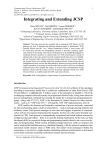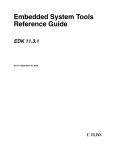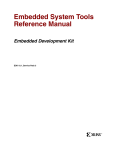Download LW P User Manual - scs technical report collection
Transcript
CMU-ITC-85-037
LW P User
Manual
24 June 85 13:12
Jonathan Rosenberg
(Larry Raper)
Information Technology Center
Carnegie-Mellon University
Schenley Park
Pittsburgh, PA 15213
Table
of Contents
Preface
1
1. The LWP Package
3
1.1.
1.2.
1.3.
1.4.
Key Design Choices
A Simple Example
Constants and Data Structures
LWP Runtime Calls
5
5
6
8
2. The Lock Package
2.1.
2.2.
2.3.
2.4.
19
Key Design Choices
A Simple Example
Constants, Macros and Data Structures
Lock Calls
3. The IOMGR Package
19
20
21
23
29
3.1. Key Design Choices
3.2. A Simple Example
3.3. IOMGR Calls
29
29
30
4. The Timer Package
33
5, A Simple Example
5.1. Timer Calls
35
36
Appendix
I, Summary
of LWP-Related
Calls
Appendix II, Usage Notes for the ITC SUN Systems
I1.1. LWP
11.2.Lock
11.3.IOMGR
11.4.Timer
43
45
45
45
45
45
Preface
This document describes several packages of programs that have been designed for use by the VICE
group.
The packages
are all based on the LWP package, which is a suite of lightweight
functions usable from a C program.
each of the additional utilities.
The LWP package is described
first, followed
process
by sections for
1. The LWP Package
The LWP package implements
primitive functions
providing
written in C, to proceed in an unsynchronized fashion.
basic facilities that enable procedures
These separate threads of control may
effectively progress in parallel, and more or less independently of each other. This facility is meant to
be general purpose with a heavy emphasis on simplicity. Interprocess communication facilities can
be built on top of this basic mechanism, and, in fact, many different IPC mechanisms could be
implemented.
The functions described
here currently are available on the SUN Microsystems
Workstation under Unix 4.2.1
In order to set up the environment needed by the lightweight process support, a one-time invocation
of the LWP_lnitializeProcessSupport
function must precede the use of the facilities described
here. The initialization function carves an initial process out of the currently executing C procedure.
The process id of this initial process is returned as the result of the LWP
function.
For symmetry a LWP__TerminateProcessSupport
release any storage allocated by its initial counterpart.
created by the LW P InitiatizeP rocessSupport
InitializeProcessSupport
function may be used explicitly to
If used, it must be issued from the process
function.
Upon completion of any of the lightweight process functions, an integer value is returned to indicate
whether any error conditions were encountered.
A global variable Iwp_debug
can be set to activate or deactivate debugging messages tracing the
flow of control within the LWP routines.
To activate debugging messages, set Iwp
debug to a
non-zero value. To deactivate, reset it to zero. All debugging output from the LWP routines is sent to
stdout.
Macros, typedefs,
and manifest constants
mechanism reside in the file I itcl itcl
type PROCESS,
for error
codes needed
nfsl Include/Iwp.h.
by the lightweight
process
A process is identified by an object of
which is defined in the include file.
The process model supported by the operations described here is based on a non-preemptive priority
dispatching
scheme. (A priority is an integer in the range [0..LW P_MAX_PRIORITY],
lowest priority.)
until
Once a given lightweight
it voluntarily
relinquishes
(LWP_DispatchProcess)
its claim
process is selected and dispatched,
on the CPU.
Relinquishment
where 0 is the
it remains in control
may be either
or implicit (through the use of certain other LWP operations).
explicit
In general,
1The LWP package was originally developed by Larry Raper for use in implementing the SNA network protocol on the Sun.
4
all LWP operations
that may cause a higher
preempt the process requesting
the service.
priority process to become
ready for dispatching,
When this occurs, the priority dispatching
takes over and dispatches the highest priority process automatically.
mechanism
Services in this category (where
the scheduler is guaranteed to be invoked in the absence of errors) are
LWP
CreateProcess
LWP WaitProcess
LWP
MwaitProcess
LW P_Sig nalProcess
LWP_Dispatch
Process
LW P_Destroy Process
The following
services are guaranteed
losing control to another lightweight
LWPInitializeProcessSupport
LWP
NoYieldSignal
LWP
CurrentProcess
LW P ActiveProcess
not to cause preemption
process):
(and so may be issued with no fear of
t.1.
Key
Design
Choices
The packageshouldbe smallandfast;
All
1.2.A
processes
are
other's
actions;
There
is no time
Simple
assumed
slicing
to
be trustworthy
or preemption
-- the
-
processes
processor
must
are
not
be yielded
protected
explicitly.
Example
# Include "/itc/itc/nfs/Include/Iwp.h*
static read process(id)
Int * id;
{
LWP
DispatchProcess();
/*
Just relinquish control for now */
for (;;) {
/ * Wait until there Is something in the queue *1
while (empty(q)) LWP
/*
WaitProcess(q);
Process queue entry*/
LW P_Dispatch Process();
}
}
static write processO
{
,.o
/*
Loop & write data to queue */
1or (mesg = messages; * mesg! =0; mesg + +) {
insert(q, * mesg);
LW P_Sig nal Process(q);
}
}
main(argc, argv)
int argc; char * * argv;
{
PROCESS * id;
LW P InitializeP rocessSu pport (0, &id);
/* Now create readers */
for (i =0; i <nreaders; t+ +)
LWP .CreateProcess(read_process,
LWP CreateProcess(wnte_process,
/ * Wait for processes to terminate
STACK_SIZE,
STACK
0, i, *Reader',
SIZE, 1,0, "Writer',
*/
LW P Wait Process(&done);
for (i =nreaders-1;
}
i >=0; i-) LWP
DestroyProcess(readers[i]);
&readers[i]);
&writer);
from
each
Editorial
These definitions
Note:
are found in the C header file "/itc/itc/nfs/include/Iwp.h'.
the authoritative
Those header files are
source of these definitions, and will be more up-to-date than this manual.
1.3.Constants
and Data Structures
t
•
*
Information
•
Carnegie-Mellon
Technology
Center
*
University
•
e
•
•
(c) Copyright
IBM Corporation,
# define LWP
# define LWP
SUCCESS
EBADPID
# define LWP
# define LWP
EBLOCKED
EINIT
-3
-2
# define LWP
EMAXPROC
-4
# define LWP
# defineLWP
# defineLWP
ENOBLOCK
-5
ENOMEM
-6
ENOPROCESS -7
# defineLWP
# define LWP
ENOWAIT
-8
EBADCOUNT -9
# define LWP
EBADEVENT
# define LWP
# define LWP
EBADPRI
-11
NO STACK
-12
1985
*
0
-1
-10
I* Maximum priority permissible (minimum is always 0) */
# define LWP MAX PRIORITY 1
I * Maximum #
# define LWP
events that process may wait on at any time * I
MAX EVENTS 20
typedef struct lwp
struct Iwp
pcb * PROCESS;
context {
char*topstack;
/* saved context for dispatcher*/
/* ptrtotopofprocessstack*/
};
struct Iwp pcb {
char
name[32];
int
rc;
char
char
status;
*eventlist[LWP
int
eventcnt;
in,
in*
wakevent;
waitcnt;
char
/*
/* process control b_ock * I
I t ASCII name*/
most recent return code e/
/ * status flags */
MAX EVENTS];
char
int
*stack;
stacksize;
int
(*ep)();
eventids*/
/ * index of eventid causing wakeup */
I * rain number of events awaited • /
blockflag;
int
priority,
PROCESS
misc;
/* ptrto arrayof
/ * no. of events in eventlist array*/
/ * if (blockfiag),
process blocked */
/* dispatching priority*/
/ * for LWP internal use only *1
I* ptr to process stack */
/ * size of stack *1
/*
initial entry point */
char
* parm;
struct Iwp context
context;
PROCESS
I* initial parm for process */
I* saved context for next dispatch */
next, prev;
/ * ptrs to next and previous pcb *1
};
# ffndef LWP
# define LWP
KERNEL
ActiveProcess
(Iwp
cpptr+0)
# define LWP
SignaIProcess[event)
LWP
INTERNALSIGNAL{event,
1)
# define LWP
NoYieldSignal(event)
LWP
INTERNALSIGNAL(event,
0)
extern
# endif
PROCESS
struct
int
char
Iwp
/* pointer to current process pcb */
Iwp ctl {
processcnt;
/* LWP control structure*/
/* number of lightweight processes *1
* outersp;
PROCESS
PROCESS
char
cpptr;,
/ * outermost stack pointer */
outerpid;
first, last;
I*
dsptchstack[800];
I* process carved bylnitialize*/
ptrs to ftrst and last pcbs */
/ * stack for dispatcher use only*/
};
# ifndefLWP
extern
KERNEL
# endif
char Iwp
debug;
/*
ON = show LWP debugging trace*/
8
1.4.LWP
Runtime
Calls
LWP InitializeProcessSupport
Initialize
LWP support & start initial process
Call:
int LWP._lnitializeProcessSupport( in int priority, out PROCESS *pid )
Parameters:
priority
Priority at which initial process is to
run.
pid
The process Id of the initial process will be returned in this parameter.
Completion Codes:
LWPSUCCESS
At=wentwell
LWP E/NIT
This routine has already been called.
LWPEBADPRI
Illegal priority specified (<) ortoo large)
Initializes the LWP package. In addition, this routine turns the current thread of control into the initial
process withthe specified priority. The processid of this initial processwillbe returned in parameter
pid. This routine must be called to ensure proper initializationof the LWP routines. This routine will
not cause the schedulerto be invoked.
LW P_Termin
Terminate
ateProcessSupport
process
support
and clean up
Call:
int LWP._TerminateProcessSupport(
)
Parameters:
None
Completion
Codes:
None
This routine will terminate the LWP process support and clean up by freeing any auxiliary storage
used.
This routine must be called from within the procedure and process that invoked
LWP
LWP
InitializeProcessSupport.
After
LWP TerminateProcessSupport
has
InitializeProcessSupport may be called again to resume LWP process support.
been
called,
10
LWP
CreateProcess
Create
and start
a light-weight
process
Call:
int LWP_CreateProcess(
in int (* ep)O, in int stacksize, in int priority,
in char *parm, in char *name.
out PROCESS *pid )
Parameters:
ep
This is the address of the code that is to execute the function of this process.
This parameter should be the address of a C routine with a single parameter.
stacksize
This is the size (in bytes) to make the stack for the newly-created
The stack cannot be shrunk or expanded,
priority
parm
This is the priority to assign to the new process.
This is the single argument
that will be passed to the new process.
this argument is a pointer and, in general
structure containing
name
Completion
Note that
will be used to pass the address of a
further "parameters'.
This is an ASCII string that will be used for debugging
process.
pid
process.
it is fixed for the life of the process.
purposes to identify the
The name may be a maximum of 32 characters.
The process id of the new process will be returned in this parameter
Codes:
LWP SUCCESS
processcreatedsuccessfully
LWPENOMEM
Not enough free space to create process
LWP EBADPRI
Illegal priority specified (<0 or too large)
LWP_EINIT
LWP
lnitializeProcessSupport
has not been called
This routine is used to create and mark as runnable a new light-weight process. This routine will
cause the scheduler to be called. Note that the new process will begin execution before this call
returns only if the priority of the new process is greater than the creating process.
11
LW P_Destroy
Destroy
Process
a light-weight
process
Call:
int LWP_DestroyProcess(
in PROCESS *pid )
Parameters:
pid
Completion
The processid ofthe processto be destroyed
Codes:
LWPSUCCESS
Processdestroyedsuccessfully
L WP_EINIT
LWP Initia2izeProcessSupport
hasnotbeencalled
This routine will destroy the specified process. The specified process will be terminated immediately
and its internal storage will be freed. A process is allowed to destroy itself (of course, it will only get to
see the return code if the destroy fails). Note a process may also destroy itself by executing
from the C routine. This routine calls the scheduler.
a return
12
LWP
Wait
WaitProcess
for
event
Call:
int LWP._WaitProcess(
in char
"event)
Parameters:
Completion
This
routine
Ttle event to wait for. This can be any memo_ address, BUt,0 is an illegal
event.
LWP_SUCCESS
The event has occured
LWP._EINIT
LWP InitializeProcessSupporthas not been called
LWPEBADEVENT
The specified event was illegal (0)
Codes:
will
LWP_SignalProcess
not queued:
scheduler.
event
put
the
or LWP
calling
process
NoYieldSignal
if a signal occurs and no process
to
sleep
until
with the specified
is woken
another
event.
process
does
a
call
of
Note that signals of events are
up, the signal is lost. This routine invokes the
13
LWP
Wait
MwaitProcess
for a specified
number
of a group
of signals
Call:
int LWP_MwaitProcess(
in int wcount,
in char"
evlist[]
)
Parameters:
wcount
Is the number of eventsthat must be signaledto wake up this process
evlist
This a null-terminatedlist of events (remember that 0 Js not a legal event).
There may be at most LWP MAX EVENTS events.
Completion
Codes:
LWPSUCCESS
LWP
The specifiednumberof appropriate signalshas occurred
EBADCOUNT
There
are too few events
(0), or
too
many events (more than
LWP MAX_EVENTS),or wcount >the number of events in evlist
LWP_E/NIT
LWP InltializePmcessSupporthas not been called
This routine allows a process to wait for wcount signals of any or the signals in evlist.
signals of a particular event is only counted once. The scheduler will be invoked.
Any number of
14
LWP
SignalProcess
Signal
an event
Call:
int LWP SignalProcess(
in char * event)
Parameters:
event
Completion
The event to be signaled.
An event is any memory address except 0
Codes:
LWPSUCCESS
The signal was a success (a process was waiting for it)
LWP_EBADEVENT The specified
event was illegal (0)
LWPE/NIT
LWP_lnitializeProcessSupport
LWP_ENOWA/T
No process was waiting for this signa!
was not called
This routine causes event to be signaled. This will mark all processes waiting for only this event as
runnable. The scheduler will be invoked. Signals are not queued: if no process is waiting for this
event, the signal will be lost and LWP ENOWAIT will be returned.
15
LW P_NoYieldSignai
Signal an event,
but don't yield
Call:
int LWP_No YieldSignal( in char "event)
Parameters:
event
Completion
The eventto besJgnalecl.
Aneventisanymemoryaddressexcept0
Codes:
LWP SUCCESS
Thesignalwasa success(a processwaswaitingtorit)
LWP_.EBADEVENT Thespecifiedeventwasillegal(0)
LWPEINIT
LWP tnitializeProcessSupport
wasnotcalled
LWP__ENOWAIT
Noprocesswaswaitingforthis signal
This routine causes event to be signaled. This will mark all processes waiting for only this event as
runnable. This call is identical toLWP
SignalProcess except that the scheduler will not be invoked
-- control will remain with the signalling process. Signals are not queued: if no process is waiting for
this event, the signal will be lost and LWP_ENOWAIT will be returned.
16
LWP
DispatchProcess
Yield to the scheduler
Call:
int LWP DispatchProcess(
)
Parameters:
None
Completion
Codes:
LWP
SUCCESS
LWP_.EINIT
All
wentwell
LWP InitializeProcessSupport
hasnotbeencalled
This routine is a voluntary yield to the LWP scheduler,
17
LW P_CurrentProcess
Get
the current
process
id
Call:
int LWP_CurrentProcess(
out PROCESS
* pid )
Parameters:
pid
Completion
The current processid will be returned in this parameter
Codes:
LWP
SUCCESS
LWP_EINIT
This routine will place the current
The current process id has been returned
LWP InitializeProcessSupporthas not been called
process
id in the parameter
pid,
18
LW P ActiveProcess
Yield current
process
id
Call:
PROCESS LWP._AcfiveProcess(
)
Parameters:
None
Completion
Codes:
None
This is a macro that yields the current process id. If LWP InitializeProcessSupport
has not been
called, the invocation yields O. It exists because people may find it more convenient than
LWP CurrentProcess.
19
2. The Lock
Package
The lock package contains a number of routines and macros that allow C programs that utilize the
LWP abstraction to place read and write locks on data structures shared by several light-weight
processes. Like the LWP package, the lock package was written with simplicity in mind - there is no
protection inherent in the model.
In order to use the locking mechanism for an object, an object of type struct
associated with the object.
invocations
of
the
After being initialized, with a call to Locklnit,
macros
ObtainReadLock,
ObtainWriteLock,
Lock
must be
the lock is used in
ReleaseReadLock
and
ReleaseW riteLock.
The semantics of a lock is such that any number of readers may hold a lock. But only a single writer
(and no readers) may hold the clock at any time.
and writer
will eventually
The lock package guarantees fairness: each reader
have a chance to obtain
guaranteed
if the priorities
guaranteed
by the package.
of the competing
a given lock.
processes
However, this fairness
are identical.
is only
Note that no ordering
is
In addition, it is illegal for a process to request a particular lock more than once, without first releasing
it. Failure to obey this restriction
2.1.
Key
Design
may cause deadlock.
Choices
The package must be simple and fas_3:in the case that a lock can be obtained
immediately, it should require a minimum of instructions;
All the processes using a lock are trustworthy;
The lock routines ignore priorities;
2O
2.2.A
Simple
Example
# include'lock,h"
struct Vnode {
,..
struct Lock lock; /*
Used to Iockthis vnode*/
..,
};
# define READ
# clefineWRITE
0
1
struct Vnode*get
char * name;
vnocle(name, how)
int how;
{
struct Vnode * v;,
v --- lookup(name);
if(how == READ)
Obtain Read Loc k(&v- >lock);
else
ObtainWriteLock(&v-
}
>lock);
21
Editorial
Note:
Thesedefinitionsarefoundin the Cheaderfile "/itc/itc/nfs/include/Iock.h'. Thoseheaderfilesare
the
authoritative
source
of these
2.3. Constants,
definitions,
Macros
and
will
be more
up-to-date
than
this
and Data Structures
•
Information Technology Center
•
Carnegie-Mellon
•
•
(c) Copyright IBM Corporation, 1985
University
*
•
*
t
/*
Include file for using Vice locking routines.
*/
struct Lock {
int
readers
waiting;
/* #
readers waiting */
Int
readers
reading;
I* # readers actually with read locks*/
lnt
writers
waiting;
/* # writers waiting */
unsigned char
write locked;
/ • i =0 if a writer has it locked */
};
# define READ
# defineWRITE
LOCK
LOCK
1
2
# define ObtainReadLock(Iock)\
if(f(Iock)-:_write
locked && !(Iock)-:wnters
(lock) ->readers
reading + +;\
else\
Lock
Obtain(lock,
READ
waiting)\
LOCK)
# define ObtainWriteLock(Iock)\
if (!(Iock)-:_wnte
(lock)- >write
else\
Lock
locked && l(Iock)-:l'eaders
locked++;\
Obtain(lock,
WRITE
LOCK)
# define ReleaseReadLock(Iock)\
(i-(Iock)-_'eaders
reading && (Iock)-:_,'nters
LWP
0)
reading)\
SignalProcess(&(Iock)-:writers
waiting
waiting)
?\
:\
# define ReleaseWriteLock(Iock)\
((lock)- _write
(Iock)-_'eaders
locked-,\
waiting ? LWP
SignalProcess(&(Iock)-_,eaders
I(Iock)-:_,_aders
reading && (Iock)-:wnters
LWP SignalProcess(&(Iock)-:_vnters
0)
# define CheckLock(Iock)\
waiting ?\
waiting) :\
waiting)
:0,\
manual.
22
(-((int)(Iock)-:_wnte
locked)
/ * I changed above from:
+ (Iock)-::_aders
reading)
(-(Iock)-:_wnte locked +(Iock)-_eaders
reading)
because write
locked wash1 being sign extended.
The following code was generated:
movl a6L_ (C),a5
movb
negb
andl
addl
moveq
aS@ (20),dO
dO
# Oxff,dO
aS_ (18),d0
# OxO,dl
cmpl # OxO,dO
scs dl
negb
movl
(Bob)
*/
dl
dl,a6@ (FFFFFFFC)
23
2.4. Lock
Calls
Locklnit
Initialize
a lock
Call:
Locklnit( out struct Lock ° lock )
Parameters:
lock
Completion
The (addressofthe)lockto beinitialized
Codes:
None
This routine must be called to initialize a lock before it is used.
24
ObtainReadLock
Obtain
a read lock
Call:
ObtainReadLock(
in out struct Lock "lock )
Parameters:
lock
Completion
Tl_elockto berP_,ad-locked
Codes:
None
A read lock will be obtained on the specified lock. Note that this is a macro and not a routine. Thus,
results are not guaranteed if the lock argument is a side-effect producing expression.
25
ObtainWriteLock
Obtain
a write
lock
Call:
ObtainWnteLock(
in out struct Lock "lock )
Parameters:
lock
Completion
The lock
to bewrite-locked
Codes:
None
A write lock will be obtained on the specified lock. Note that this is a macro and not a routine. Thus,
results are not guaranteed if the lock argument is a side-effect producing expression.
26
ReleaseReadLock
Release
a read lock
Call:
ReleaseReadLock(
in out struct Lock "lock )
lock
The lock to be released
Parameters:
Completion
Codes:
None
The specified lock will be released. This macro requires that the lock must have been previously
read-locked. Note that this is a macro and not a routine. Thus, results are not guaranteed if the lock
argument is a side-effect producing expression.
27
ReleaseW
Release
riteLock
a write
lock
Call:
ReleaseWr_teLock(
In out struct Lock "lock )
lock
Thelocktobe released
Parameters:
Completion
Codes:
None
The specified lock will be released. This macro requires that the lock must have been previously
write-locked. Note that this is a macro and not a routine. Thus, results are not guaranteed if the lock
argument is a side-effect producing expression.
28
CheckLock
Check
status
of a lock
Call:
int CheckLock(
in struct Lock "lock )
Parameters:
lock
Completion
The lock to be checked
Codes:
None
This macro yields an integer that specifies the status of the indicated lock. The value will be -1 if the
lock is write-locked, 0 if unlocked, or a positive integer that indicates the numer of readers with read
locks. Note that this is a macro and not a routine.
Thus, results are not guaranteed if the lock
argument is a side-effect producing expression.
29
3. The IOMGR
Package
The IOMGR package contains 3 routinesthat aid in performingUnix selects within the LWP
paradigm.
which
After
has
to sleep
initializing
parameters
until
such
time
priority,
single
select
and wakes
The
those
meanings
of the
up and
select.
processes
are
coalesces
up all processes
Design
A blocking
3.2.A
wakes
light-weight
to the Unix
as no user
lowest
Key
package,
identical
at the
3.1.
the
processes
may
IOMGR_Select,
active.
affected
however,
At this time
all of the
select
by the
make
the
calls
puts
IOMGR
to IOMGR_Select,
the
process,
select
the
parameters,
both
before
It then
performs
the
should
be identical
to
result.
and
after
should
only
be done
if no other
call,
processes
are
runnable.
Example
SocketLJstener 0
Int ReadfclMask, WritefdMask,
ExceptfdMask, rc;
struct timeval *tvp;
while(TRUE)
{
ExceptfdMask = ReadfdMask
WntefdMask = 0;
rc = IOMGR
----(1 <<rpc2
Select(8*sizeof(int),
RequestSocket);
&ReadfdMask,
&WritefdMask,
switc h(rc) {
case0:
/*timeout*/
continue;
case-1:
/ * main while loop* /
/* error*/
SystemError(" IOMGR
Select');
ex_(-1);
case 1:
/*
packet on rpc2
RequestSocket
•.. process packet...
break;
clefault:
}
}
/* should neveroccur*/
*/
runs
together.
{
}
which
Choices
of
void rpc2
process
requests
Unix select;
Simple
calling
&ExceptfdMask,
tvp);
a
3O
3.3. IOMGR
Calls
IOMGR Initialize
Initialize
the IOMGR package
Call:
int IOMGR_lnitialize(
)
Parameters:
None
Completion
Codes:
LWP SUCCESS
AWlwent
we_l
L WP__ENOMEM
Not enough free space to create the IOMGR process
LWPEINIT
LWP
-1
Something went wrong with the TIMER package
InitializeProcessSupport
has not been called
This call will initialize the IOMGR package. Its main task is to create the IOMGR process, which runs
at priority O, the lowest priority. The remainder of the processes must be running at priority 1 or
greater for the IOMGR package to function correctly.
31
IOMGR
Finalize
Finalize
the IOMGR package
Call:
int IOMGR_Finalize(
)
Parameters:
None
Completion
Codes:
LWP_SUCCESS
Packagefinalizedokay
LWPEINIT
LWP InitializeProcessSupport
hasnot beencalled
This call cleans up when the IOMGR package is no longer
destroys the IOMGR process.
needed.
It releases all storage
and
32
IOMGR
Perform
Select
an LWP select
operation
Call:
int IOMGR_Select(
in int fds. in out int * readfds, in out ° writefds,
in out "exceptfds, in struct timeval *timeout)
Parameters:
fds
MaxJmum number of bits to consider in masks
readfds
Mask of file descriptors
that process wants notification
of when ready to be
that process
of when ready to be
read
writefds
Mask of file descriptors
wants notification
written
exceptfds
Mask of file descriptors
that process wants notification of when exceptional
condition occurs
timeout
Completion
Timeout for use on this select
Codes:
None
This function performs an LWP version of Unix select. The parameters have the same meanings as
the Unix call. However, the return value will only be -1 (an error occured), 0 (a timeout occured), or 1
(some number of file descriptors are ready). If this is a polling select, it is done and IOMGR_Select
returns to the user with the results. Otherwise, the calling process is put to sleep. If at some point,
the IOMGR process is the only runnable process, it will awaken and collect all select requests. It will
then perform a single select and awaken those processes the appropriate processes - this will cause
return from the affected IOMGR_selects.
33
4. The Timer
Package
The timer package contains a number of routines that assist in manipulating
struct
TM_Elem.
package-maintained
TM_Elerns
list.
(timers) are assigned a timeout value by the user and inserted in a
The time remaining
package under user control.
lists of objects of type
to timeout for each timer is kept up to date by the
There are routines to remove a timer from its list, to return an expired
timer from a list and to return the next timer to expire.
the IOMGR package and by the implementation
This specialized
package is currently
used by
of RPC2.
A timer is used commonly by inserting a field of type struct
TM_Elem
into a structure. After inserting
the desired timeout value the structure is inserted into a list, by means of its timer field.
34
5.A
Simple
Example
static struct TM_Elem
* requests;
o,,
TM Init(&requests);
/ ° Initialize timer list */
...
for
(;;){
TM_Rescan(requests);
/ * Update the timers *1
expired -----TM_GetExpired(requests);
it (expired = = 0) break;
•.. process expired element...
}
36
5.1. Timer
Calls
TM Init
Initialize
a timer list
Call:
int TM_lnit( out struct TM_E/em "" list)
Parameters:
list
The list to be initialized
Completion Codes:
0
ok
-1
not enough free storage
The specified list will be initializedso that it is an empty timer list. This routine must be called before
any other operationsare appliedto the list.
37
TM_Final
Finalize
a tim er list
Call:
in t TM_Final( i n out struc t TM_Elem * °/ist)
Parameters:
list
Completion
The listto befinalized
Codes:
0
ok
-1
*listwas0 orlistwasneverinitialized
Call this routine when you are finished with a timer list and the list is empty. This routine releases any
auxiliary storage associated with the list.
38
TM_lnsert
Initialize
a timer
element
and insert
it into a timer
list
Call:
void TM_lnsert( in struct TM_Elem * list, in out struct
TM_Elem ° elem )
Parameters:
Completion
list
The list into which the element is to be inserted
elem
The e_ement to be initialized and inserted
Codes:
None
The element elem is initialized so that the TimeLeft field is equal to the TotalTime field. (The TimeLeft
field may be kept current by use of TM_Rescan.) The element is then inserted into the list.
39
TM
Rescan
Update
TimeLeft fields
of entries
on a tim er list and look for expired
elements
Call:
int TM Rescan( in out struct TM_Elem *list)
Parameters:
list
Completion
The list to be updated
Codes:
None
This routine will update the TimeLeft fields of all timers on list. (This is done by checking the time of
day clock in Unix.) This routine returns a count of the number of expired timers on the list. This is the
only routine (besides TM_lnit that updates the TimeLeft field.
4O
TM_GetExpired
Return
an expired
timer
from a list
Call:
struc t TM_Elem "TM_G etExpired( in struct TM_Elem * list)
Parameters:
list
Completion
The list to be searched
Codes:
None
The specified list will be searched and a pointer to an expired timer will be returned. 0 is returned if
there are no expired timers. An expired timer is one whose TimeLeft field is less than or equal to O.
41
TM
GetEarliest
Return
the earliest
timer
on a list
Call:
struct TM_Elem * TM_G etEartiest( in struct TM_Elem * list)
Parameters:
list
Completion
The list to be searched
Codes:
None
This routine returns a pointer to the timer that will be next to expire - that with a smallest TimeLeft
field. If there are no timers on the list, 0 is returned.
42
TM_eql
See if 2 timevals
are equal
Call:
unsigned char TM_eql( in struct timeval * tl, in struct timeval * t2 )
Parameters:
Completion
tl
a timeval
t2
Anothertimeval
Codes:
None
This routine returns 0 if and only if tl and t2 are not equal.
43
Appendix
Summary
I
of LWP-Related
Calls
Note: The numbers in square brackets indicate the page on which the call is described.
[8l
L WP_lnitializeProcessSupport(in
int priority, out PROCESS *pid)
[9]
L WP Terrain a tePro cessS upp ortO
[lo]
LWP CreateProcess(i.
int (* ep)O, in int stacksize, in int priority,
in char *parm, in char * name,
out PROCESS *pid)
[11]
LWP_DestroyProcess(in
PROCESS " pid)
[12]
LWP
WaitProcess(in
char ° event)
[13l
LWP_MwaitProcess(in
int wcount, in char" evlist[])
LWP SignalProcess(in
char * event)
LWP_NoYieldSignal(in
char" event)
[14]
[15]
[161
LWP
DispatchProcessO
[17]
L WP_CurrentProc
ess(out PROCESS *pid)
[18]
LWP ActiveProcessO
[23]
Lock/nit(out
struct Lock * lock)
[24]
ObtainReadLock(in
out struct Lock ° lock)
ObtainWr_teLock(in
out struct Lock * lock)
[25]
[26]
ReleaseReadLock(in
out struct Lock * lock)
ReleaseWriteLock(in
out struct Lock * lock)
[27]
[28]
CheckLock(in
[30]
struct Lock * lock)
44
IOMGR_lnitializeO
[31]
IOMGR_FinalizeO
[32]
IOMGR_Select(in int fds, in out int * readfds, in out * wrftefds,
in out * exceptfds, in struct timeval * timeout)
[36]
TM Init(out struct TM_Elem * * list)
[37]
TM Final(in out struct TM_Elem * *list)
[38]
TM Insert(ln struct TM_Elem * list, in out struct
[39]
TM Rescan(in out struct TM_Elem °list)
[40]
TM G etExpired(in
struc t TM_Elem * list)
TM GetEarliest(in
struct TM_Elem "list)
[41}
[42]
TM eql(in struct timeval * tl , in struct timeval * t2)
TM_Elem * elem)
45
Usage
Notes
Appendix
II
for the ITC SUN Systems
I1.1. LW P
In order to use the LWP package it is necessary to include the file / itcl itcl nfsl include/Iwp.h
your C source programs.
This file contains the definitions of a process id (PROCESS),
in
the error
return codes and several auxiliary definitions.
The simplest way to link in the LWP objects is by including the library I itc/itc/nfsl
lib/Iwp.o
during link editing.
It is also possible to configure your system in such a way that the LWP package will check for stack
overflows during the execution
of each process.
checking
with the -p option to cc. (Note that this means that profiling can not
for must be compiled
be performed when stack checking
is in effect.)
In order to do this all routines that you desire stack
In addition, your system must be linked by using Id
directly as follows:
ld-X/itc/itc/nfs/lib/start.o
{your objects}
/itc/itc/nfs/lib/lwp.
o ...
11.2. Lock
In order to use the lock package it is necessary to include the file I itc/itcl
nfsl include/lock,h
your C source programs.
During link editing the library/itcl
itcl nfs/lib/Iwp.o
must be included.
11.3.1OMGR
During link editing the library ! itcl itcl nfs/lib/iomgr.o
must be included.
11.4. Timer
In order to use the Timer package it is necessary to include the file I itc/itcl
in your C source programs.
During link editing the library ! itc/itc/nfs/
lib/timer.o
must be included.
nfs/include/timer.h
in
























































